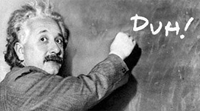
- Can I Have a Word With You?
- Ronsdale Press (2007)
[Editor's note: In his fifth book about language, Howard Richler moves from A to Z with a specifically chosen word for every letter of the alphabet. L is for "like."]
In promoting my book Take My Words some years ago, I was the guest "expert" on several radio call-in programs. The theme of these programs was the ever popular, "What are your pet peeves about the English language?" Callers vented their most disliked usages, such as the word "hopefully," split infinitives, using "who" in place of "whom," etc. I explained that it was not altogether clear that there was anything wrong with the usages they disliked. As writer Anthony Burgess said in his book A Mouthful of Air, "the emotions aroused by group loyalty obstruct the making of objective judgments about language. When we think we are making such a judgment, we are merely making a statement about our prejudices."
On the "top 10" list of hated usages was the word "like" employed as filler, particularly by adolescents. At that time, I was unable to offer any cogent arguments in defence of its prolific usage.
Recently, however, I read Cool: The Signs and Meanings of Adolescence, by University of Toronto linguist Marcel Danesi, in which he undertakes a spirited defence of "like." While the liberal usage of "like" is disparaged by many grammarians, Danesi believes that its usage actually improves the rhythms of English by making our language flow in a manner similar to the Romance languages. According to Danesi, "like" is a functional word because it gives the speaker slightly more time to formulate thoughts.
Teenagerhood: Under construction
Connie Eble, in Slang and Sociability, wrote that "ever since the Middle Ages when young men left the supervision of their families and flocked to such centres of learning as Paris and Bologna to pursue learning and life in a community of scholars, students have created an ever-changing set of words and phrases to strengthen their group identity and to set themselves off from others."
According to Danesi, "the teenager of today is . . . unmistakably different. This is because he or she has developed a new social persona within a cultural context which allows and encourages its maintenance and evolution. Rock music and various media (magazines, movies, etc.) define and sustain the style, comportment and mind-set of the modern teenager." The institution of "teenagerhood is . . . a four-decade construction of Western society."
'Pubilect'
Danesi tells us that teenage discourse, which he dubs "pubilect," is not reducible to slang status. "On the contrary, the studies show that the ways in which teens speak constitute a distinct and easily recognizable discourse code that children approaching puberty acquire unconsciously from their teen peers."
Pubilect is the particular code that teenagers employ when talking among themselves. "It is an emotive code with tendencies toward exaggeration especially in tone and voice modulation." Danesi says that "utterances such 'She's faaaaar out!' exemplify the common . . . pattern of overstressing highly emotional words by prolonging their tonic vowels."
Also characteristic of pubilect is its tendency to be highly connotative. Danesi says that "the coining of new words – 'twit,' 'bubble-head,' 'slime-bucket,' and so on -- to describe the people and events in their immediate social context is at the core of the adolescent's verbal modelling of reality."
The verbal shrug
"Like" is by no means the only prolific adolescent word. Kirk Johnson, writing in the New York Times states that with "duh," you can "convey a response, throw in a whole basket full of auxiliary commentary about the question or the statement you're responding to, and insult the speaker all at once. As in this hypothetical exchange: Parent: 'Good morning, son, it's a beautiful day.' Eleven-year-old boy: 'Duh.'"
Johnson sees "yeah-right" as the "yin to duh's yang," the antithesis to duh's emphatic thesis. Where duh is assertive and edgy, a perfect tool for undercutting mindless statements or insulting repetition, "yeah-right" is a laid-back, insouciant response to anything that is hyped. "Thus," Johnson advises, "television commercials can be rendered harmless and inert by simply saying, 'yeah-right,' upon their conclusion."
Johnson believes that "duh" and "yeah-right" are the definitive terms in our postmodern age. They have arisen to "fill a void in the language because the world has changed. Fewer questions can be answered with yes and no, while at the same time, a tidal surge of hype and mindless blather threatens to overwhelm old fashion conversation." To the rescue come "duh" and "yeah-right." I believe these terms have force when used sparingly. Unfortunately, all too often they dominate discussions.
Forever 'cool'
In terms of longevity, however, "cool" is the über-adolescent word, for the word has been cool ever since the emergence of teenage culture. "Cool" became an attitude in the 1940s emerging from the world of be-bop jazz. In 1948, the New Yorker magazine recorded that "the be-bop people have a language of their own. . . . Their expressions of approval include 'cool!'" In the 1950s, the term "cool" acquired a political connotation. Juan Rodriguez wrote in the Gazette that "staying cool" among black civil rights protesters "was a tactical stance of survival. 'Cool it' and 'keep cool' and 'don't blow your cool' became rallying cries in dealing with police provocation."
"Cool" is hardly a new word. Spelled as col it can be found in the Old English of Beowulf in 725. By the fourteenth century, Chaucer was applying "cool" to the human attribute of not being heated by passion. Hamlet's mother advises her son "upon the heat and flame of the distemper sprinkle cool patience." In The Merry Wives of Windsor, a character says, "I had swallowed snowballs for pills to cool the reins."
Even Shakespeare knew he had to stay cool. Yeah-right.




